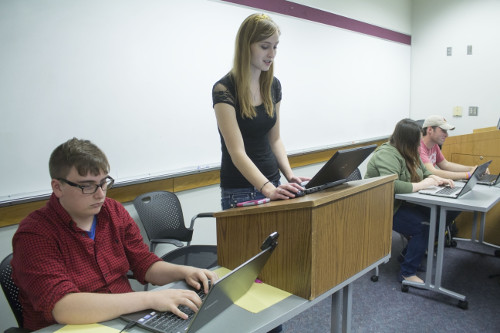By David Hurtado
In the modern age, where terms like “yolo” and “swag” are commonplace amongst the younger generation, older Americans might feel like the language is slowly being unraveled. Members of the college’s debate team, however, are hardly such lazy speakers. Armed with research and rhetoric, they engage their opponents with a silver tongue and arsenal of words befitting college level students.
Justin Stanley, debate team coach, said he was “very excited” at how the season is starting, noting the debaters have advanced to the elimination round at every tournament they’ve been to. The only challenges he said the team has encountered so far involve familiarizing themselves with this year’s topic, the restriction of Presidential war powers, and being able to answer the arguments other people make throughout the seasons as they hear them.
“Each year is a new topic, so it brings a whole new set of challenges in terms of getting everybody on board with knowledge surrounding that topic, the research you have to do to construct the arguments and learning how other teams are going to read against you and preparing for those,” Stanley said.
Over the Oct. 18-21 weekend, the team had a strong showing at the tournament championship at the University of Nevada in Las Vegas. Debaters Jesse Nation and Brenden Bower-Freeman finished 7-0 in the preliminaries and 3-0 in the semifinals. Tabi Narrelle and Blaire Warren finished 5-2 in the prelims and 2-1 in their semifinal round. Both teams advanced to the final round; but, since they were from the same school, they couldn’t debate each other and were thus named co-champions.
Warren, a second year debater on the team, said one of the most important qualities for a debater to possess is self-confidence.
“If you’re confident, then the judges believe you a whole lot more and you’ll believe your own arguments,” Warren said. “It also helps if you enjoy speaking. Debate can bring you out of your shell, but if you don’t at least have an interest in it, then it’s going to kind of drag.”
Daniel Stout, Debate Team coach, said on off-weekends, the team generally meets for at least four or five hours with a coach working on different arguments, adapting them and working on specific scenarios that could play out at the next tournament.
“During the week, we have a lot of discussions about strategies and what we’re going to be doing at the upcoming tournaments,” Stout said. “We’ll do practice speeches during the week as well. On an average week, our top three or four teams probably spend 20 to 30 hours at a minimum, working on different debate stuff, whether it be on their own time, reading and researching, or doing speaking drills.”
At the college level, each tournament is typically comprised of six or eight rounds over a three day period of time. The first two days of competition are the preliminary rounds. Each of these rounds consist of various affirmative and negative speeches that either argue a change should take place or a change should be rejected. At the end, the judge has to make a decision about which team had the better argument. The final day is reserved for out-rounds.
Nation, also a second year debater, said his favorite part of the season so far was taking first at the Vegas tournament. He comes from a background in high school debate, having three years of experience on his high school team.
“Me and my partner, we plan on clearing at CEDA, which is the giant national tournament at the end of the year,” Nation said. “It won’t be the first time, last year we had a team do it and we kind of want to keep that tradition alive of Johnson County always having a team that clears at the biggest national tournament at the end of the year. When you clear, that means you get to go to out rounds, which less than half the teams are able to do.”
Contact David Hurtado, features editor, at dhurtado@jccc.edu.






















